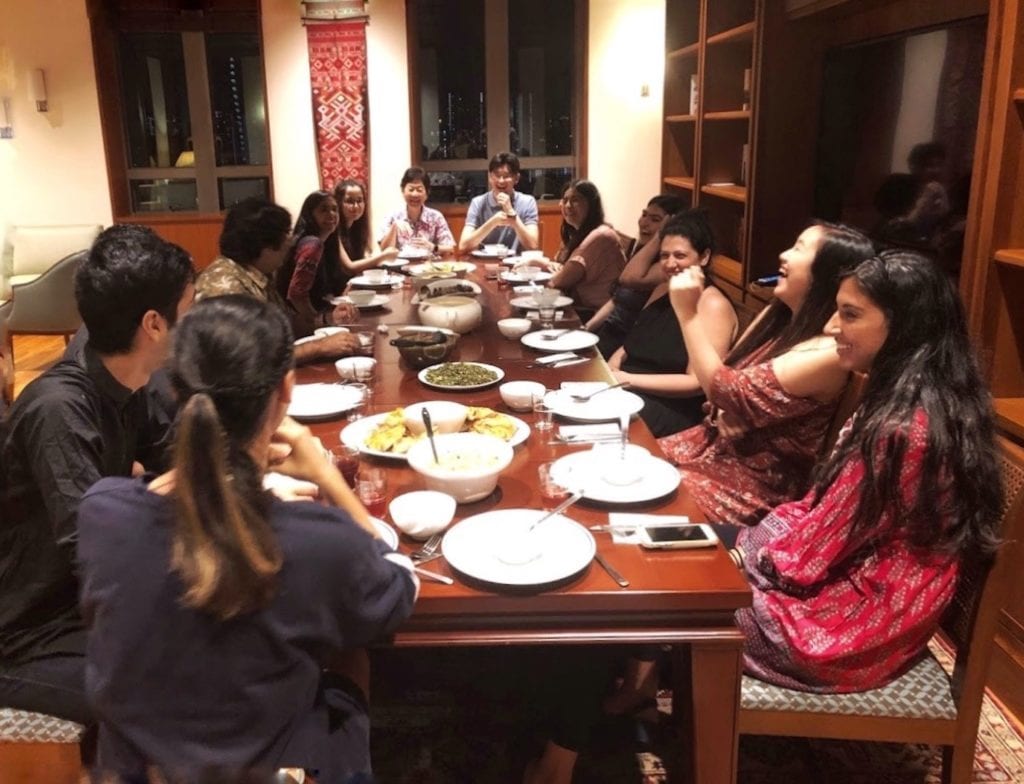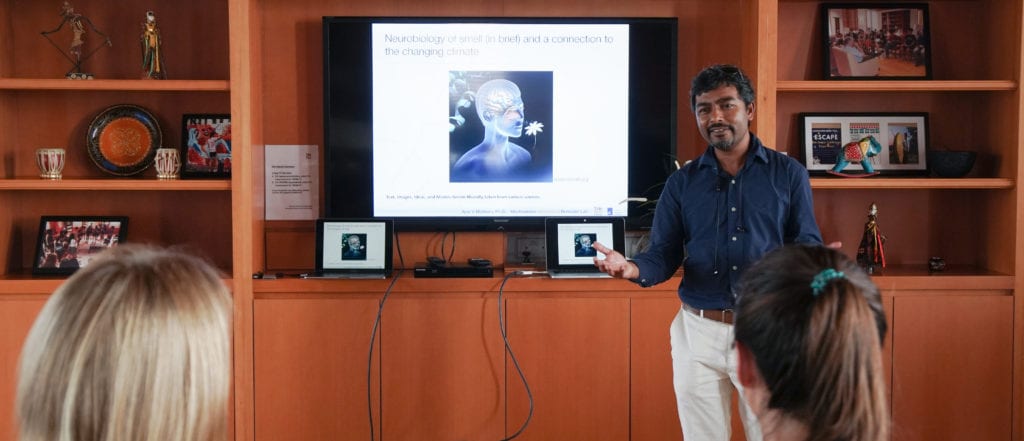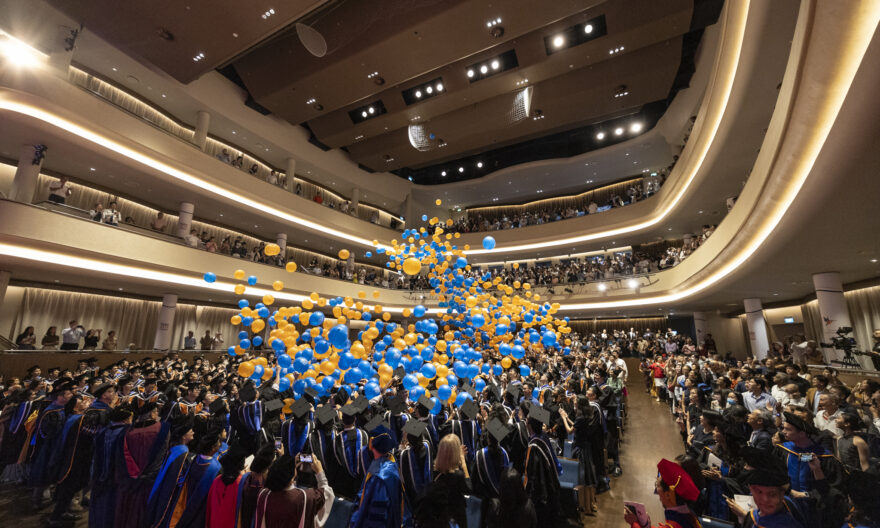Residential Colleges enrich learning with programmes throughout the semester
 Dinner at a Simmering Supper event. Image provided by Ms Munira Hyder-Adam.
Dinner at a Simmering Supper event. Image provided by Ms Munira Hyder-Adam.
The clattering of pots and pans, the sound of knives against chopping boards, the aroma of home-cooked food wafting in the air: this is the scene of students preparing for a dinner in Saga College’s Simmering Supper Series. The thrice-a-semester event brings approximately 20 guests, faculty, and students together for conversations over a freshly prepared, multi-course meal.
The Simmering Supper Series is just one example of a Residential College programme at Yale-NUS. Tapping into the knowledge and resources of residential faculty, such events expose students to different perspectives and academic insights.
This semester, Saga and Elm Colleges in particular have each organised a series of sharing sessions, open to students and faculty of the entire College.
Saga College’s Simmering Supper sessions are continuing for the third semester running. Spearheaded by Ms Munira Hyder-Adam and her husband, Associate Professor of Science (Physics) Shaffique Adam, these sessions started with a simple desire: to go beyond superficial small-talk when interacting with guests.
“We realised that truly meaningful conversations happen around the two- to three-hour mark,” said Ms Hyder-Adam. “Our idea, then, was to create a platform for participants to comfortably converse and broach topics that would not usually come up in a less intimate setting.”
The sessions are carefully curated to expose students to a wide range of experiences, based around a theme chosen by Assoc Prof Adam and Ms Hyder-Adam. Ranging from diplomacy to entrepreneurship to science, the talks expose students to the breadth of possibilities that await them after university.
At each event, Ms Hyder-Adam and a group of students craft an entire menu, then prepare all the food from scratch. The food is often created specifically with the invited guests in mind. For example, at a Supper session on diplomacy with dinner guest Ambassador Karsten Warnecke, a career diplomat from Germany and Executive Director of the Asia-Europe Foundation, the menu featured cuisines from all the countries that Ambassador Warnecke had been posted to so far.
Students start off the dinner by introducing each dish to the guests and explaining the thought process behind its creation, an ice-breaker that serves to facilitate further conversation. This culminates in a more genuine interaction with guests as compared to a typical networking session.
All in all, the experience leaves many participants coming back for more. “I’m comfortable with and enjoy the format of Simmering Suppers, which incentivises me to sign up for upcoming sessions,” said Claire Phua (Class of 2022), a three-time attendee of the sessions. “In this way, I’ve gained insight into different fields that I might not have considered learning about otherwise.”
 An Elm Liberal Arts and the Climate talk, conducted by Assistant Professor of Science (Life Sciences) Ajay Mathuru. Image by Charmaine Chua for Yale-NUS College.
An Elm Liberal Arts and the Climate talk, conducted by Assistant Professor of Science (Life Sciences) Ajay Mathuru. Image by Charmaine Chua for Yale-NUS College.
Similarly, Elm College is hosting a series of talks on “Liberal Arts and the Climate”. Across the semester, twelve Elm-affiliated faculty members are exploring the intersections between their respective disciplines and the climate crisis.
This weekly series, the first of its kind in Elm College, was initiated by the Residential College’s Rector, Associate Professor of Humanities (Philosophy) Amber Carpenter.
Rector Carpenter had sought a platform for attendees to approach the topic of climate change. At the same time, she wanted the conversation to do justice to the enormity and complexity of the climate crisis and extend beyond the field of Environmental Science, the dominant discipline that many connect with the climate. The talks hence draw explicit lines between climate change and disciplinary-specific topics of potential interest to the intellectually curious.
“These talks are intended both to share more widely discipline-specific ‘fun facts’ that are intrinsically interesting, and get all of us thinking about what the connections are between these things we think about ‘for fun’ and one of our most pressing practical concerns,” said Rector Carpenter.
Following this, Elm faculty with diverse academic interests stepped up to facilitate the Climate series. From computing to anthropology to politics, the talks equip students with different conceptual tools and disciplinary perspectives in viewing the issue of climate change.
One such speaker is Career Development Postdoctoral Fellow of Humanities (History) Sureshkumar Muthukumaran, who led a talk exploring the links between climate change and civilisational collapse in Eurasian antiquity.
“My talk highlights the capacity of pre-industrial societies to radically alter the environment and contribute to anthropogenic climate change, a phenomenon underestimated by environmental scholars of more recent periods of history,” said Dr Suresh. “By using a multidisciplinary dataset, I hope my talk piques greater interest in ancient world studies.”
The talks have since generated an audience of students and even faculty members, who are interested in climate change or attracted by specific subject areas covered in the talks.
For Lan Ran (Class of 2023), a combination of the two led her to attend the talk “Democratically Destroying the Planet” by Assistant Professor of Humanities (Philosophy) Sandra Field.
“Before college, I always focused on making individual efforts for the environment, but recently I’ve started considering how we as citizens can motivate the government to implement systemic change,” said Lan Ran. “Singapore’s a democratic country, so I thought the talk by Prof Field would be perfect for me to learn more about what environmental efforts and solutions might look like here.”
Galvanised by the success of this series, Rector Carpenter is already looking towards the possibility of a similar semester-long programme next semester.
“Perhaps, we’ll have a series featuring faculty members in the Humanities,” she said.





